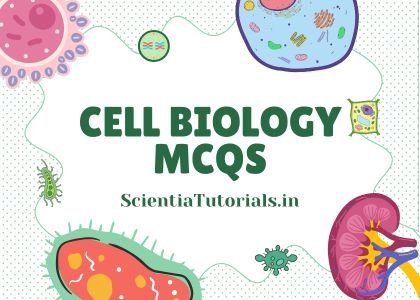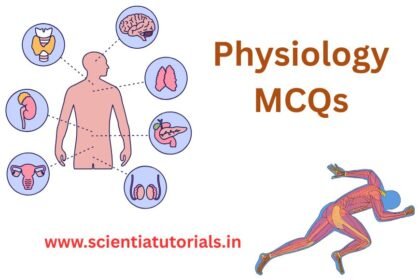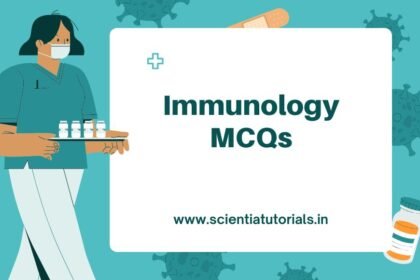Molecular Biology MCQs with Answers and Explanations These MCQs are important for CBSE/State Boards, NEET-UG/PG, Medical Science Entrances, and Competitive Exams worldwide. Q1. The sugar present in DNA is: A. RiboseExplanation: Incorrect. Ribose has a 2′-OH and occurs in RNA, …
Botany MCQs (Part 1: Q1–25) Important for CBSE/State Boards, NEET, CUET, CSIR-NET, GATE, Medical Entrances & Olympiads Q1. The term “Botany” is derived from: A. Latin word BiotaExplanation: Incorrect. Biota refers to life collectively. B. Greek word BotaneAnswer: Correct. Botane …
Zoology MCQs – Part 1 (Q1–Q25) Q1. Zoology is best defined as the study of: A) Plants B) Animals C) Microorganisms D) Fungi ✅ Answer: B) Animals Explanation: Zoology is the branch of biology dealing with the scientific study of …
Microbiology MCQs – Part 1 (Q1–Q25) Q1. The primary structural component of most bacterial cell walls is: A) Cellulose B) Chitin C) Peptidoglycan D) Ergosterol ✅ Answer: C) Peptidoglycan Explanation: Peptidoglycan (murein) gives bacteria rigidity and shape. A) Cellulose → …
🧬 Genetics MCQs – Part 1 (Q1–Q25) Q1. Genetics is best defined as the study of: A) Cells and their structure B) Inheritance and variation of traits C) Evolutionary changes in organisms D) Functions of enzymes ✅ Answer: B) Inheritance …
🧫 Cell Biology MCQs – Part 1 (Q1–Q25) Q1. The basic unit of life is the: A) Organelle B) Tissue C) Cell D) Organ ✅ Answer: C) Cell Explanation: The cell is the smallest unit that carries out life processes. …
🌱 Evolutionary Biology MCQs – Part 1 (Q1–Q25) Q1. The concept of natural selection was proposed by: A) Jean-Baptiste Lamarck B) Charles Darwin C) Gregor Mendel D) Alfred Wallace ✅ Answer: B) Charles Darwin Explanation: Darwin proposed natural selection as …
🌍 Ecology MCQs – Part 1 (Q1–Q25) Q1. Ecology is best defined as the study of: A) Organisms and their classification B) Interactions between organisms and their environment C) Evolution of species over time D) Structure of cells ✅ Answer: …
🫀 Physiology MCQs – Part 1 (Q1–Q25) Q1. The functional unit of the kidney is: A) Nephron B) Glomerulus C) Collecting duct D) Loop of Henle ✅ Answer: A) Nephron Explanation: Nephron filters blood, reabsorbs nutrients, and produces urine. Glomerulus, …
🔬 Biochemistry MCQs – Part 1 (Q1–Q25) Q1. The basic structural unit of proteins is: A) Monosaccharide B) Amino acid C) Nucleotide D) Fatty acid ✅ Answer: B) Amino acid Explanation: Proteins are polymers of amino acids linked by peptide …
Part 1 — Immunology MCQs (1–25) 1) Hallmark of adaptive immunity is: A. Phagocytosis B. Inflammation C. Immunologic memory D. Complement activation Answer: C A: Innate mechanism, non-specific. B: Innate, early response. C: Correct—memory and specificity define adaptive immunity. D: …
Part 1 — MCQs on Biotechnology (Q1–Q25) Q1. The enzyme most directly responsible for sealing nicks in the sugar-phosphate backbone during cloning is: A. DNA ligase ✅ • Joins 3′-OH and 5′-phosphate ends to form phosphodiester bonds—key for pasting inserts …
Part 1 — Marine Biology MCQs (Q1–Q25) Q1. The deepest part of the world’s oceans is: A. Tonga Trench • Deep but not the deepest. B. Mariana Trench ✅ • Challenger Deep in Mariana Trench reaches ~11,000 m. C. Java …
Part 1 — Entomology MCQs (Q1–Q25) Q1. Insects belong to which phylum? A. Arthropoda ✅ • Insects are arthropods with jointed appendages and an exoskeleton. B. Mollusca • Soft-bodied, non-jointed; includes snails, not insects. C. Annelida • Segmented worms; lack …
Part 1 — Ornithology MCQs (Q1–Q25) Q1. Birds belong to which class of vertebrates? A. Reptilia • Birds evolved from reptiles but are not classified here. B. Aves ✅ • Birds are placed in class Aves. C. Mammalia • Warm-blooded …
Part 1 — Herpetology MCQs (Q1–Q25) Q1. The branch of zoology that studies amphibians and reptiles is called: A. Ichthyology • Study of fishes. B. Ornithology • Study of birds. C. Herpetology ✅ • Deals with amphibians (frogs, salamanders) and …
Part 1 — Ichthyology MCQs (Q1–Q25) Q1. Ichthyology is the study of:A. Amphibians• That’s herpetology (amphibian part).B. Fishes ✅• Ichthys = fish; ology = study.C. Reptiles• Herpetology.D. Marine mammals• Marine mammalogy, not ichthyology. Q2. Most fishes respire primarily using:A. Lungs• …
Mycology (Study of Fungi) MCQs. Format: Question → 4 options → correct answer marked with ✅ → brief explanation under every option. Difficulty spans CBSE/ICSE & NEET/CUET to CSIR-NET/GATE/DBT-BET and international exams (GRE/BMAT/IMAT; medical overlap for USMLE/PLAB/AMC). Part 1 — …
Parasitology (Study of Parasites) MCQs. Format: Question → 4 options → correct answer marked with ✅ → brief explanation under every option. Difficulty spans CBSE/ICSE & NEET/CUET to CSIR-NET/GATE/DBT-BET and international exams (USMLE/PLAB/AMC; GRE/BMAT/IMAT). Part 1 — Parasitology MCQs (Q1–Q25) …
Virology – Study of Viruses MCQs These are structured for school boards (CBSE/ICSE), national entrance tests (NEET, CUET, CSIR-NET, GATE, DBT-BET JRF), medical licensing (USMLE, PLAB, AMC), and international exams (SAT Bio, GRE Bio, BMAT, IMAT). Part 1 — Virology …
Agricultural Biology MCQs. This set focuses on crop physiology, plant breeding, soil science, agricultural biotechnology, and ecological principles. Format = Question → 4 options → ✅ correct answer → brief explanation for each option. Part 1 — Agricultural Biology MCQs …











